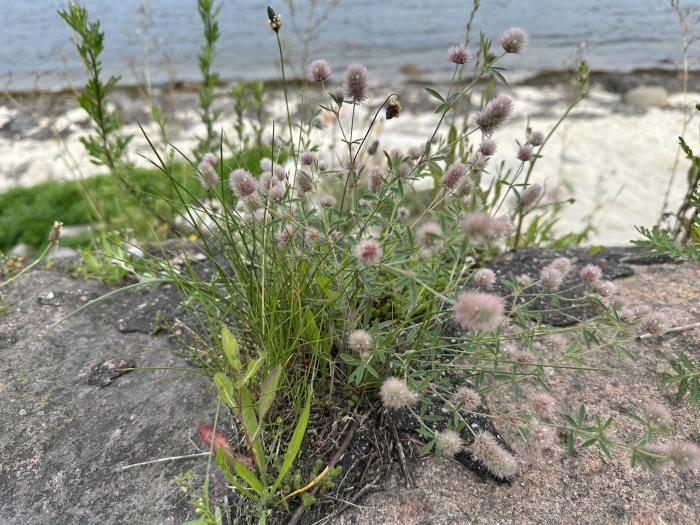Hare’s-Foot Clover
(Trifolium arvense)
Hare’s-Foot Clover (Trifolium arvense)
/
/

Katrin Simon
CC BY 4.0
Image By:
Katrin Simon
Recorded By:
Copyright:
CC BY 4.0
Copyright Notice:
Photo by: Katrin Simon | License Type: CC BY 4.0 | License URL: http://creativecommons.org/licenses/by/4.0/ | Rights Holder: Katrin Simon | Publisher: iNaturalist | Date Created: 2023-08-06T15:10:32Z |







Estimated Native Range
Summary
Trifolium arvense, commonly known as hare’s-foot clover, is a small annual or biennial herb that is native to a variety of habitats including grasslands, meadows, and sandy soils in Europe and western Asia. It typically grows up to 16 inches tall and is characterized by its distinctive soft, hairy leaves and flower heads, which resemble a hare’s foot. The flowers are pale pink to white and bloom from late spring to early autumn, adding a delicate texture to the landscape. Hare’s-foot clover is particularly adapted to dry, infertile conditions and often colonizes disturbed sites such as field edges, wastelands, roadsides, and dunes.
In cultivation, hare’s-foot clover is valued for its ability to thrive in poor soils and its use as a ground cover or green manure crop due to its nitrogen-fixing abilities, which can improve soil fertility. It is also used in wildflower meadows and naturalistic plantings. This plant prefers full sun to partial shade and requires well-drained soil. It is drought-tolerant once established and has low water requirements. While it is not commonly found in garden settings, its unique appearance can be appealing in informal or xeriscape gardens. Gardeners should be aware that Trifolium arvense can become invasive outside its native range and should be planted with caution.CC BY-SA 4.0
In cultivation, hare’s-foot clover is valued for its ability to thrive in poor soils and its use as a ground cover or green manure crop due to its nitrogen-fixing abilities, which can improve soil fertility. It is also used in wildflower meadows and naturalistic plantings. This plant prefers full sun to partial shade and requires well-drained soil. It is drought-tolerant once established and has low water requirements. While it is not commonly found in garden settings, its unique appearance can be appealing in informal or xeriscape gardens. Gardeners should be aware that Trifolium arvense can become invasive outside its native range and should be planted with caution.CC BY-SA 4.0
Plant Description
- Plant Type: Herb
- Height: 0.5-1.5 feet
- Width: 0.5-1 feet
- Growth Rate: Moderate, Rapid
- Flower Color: Pink, White
- Flowering Season: Summer
- Leaf Retention:
Growth Requirements
- Sun: Full Sun
- Water: Low
- Drainage: Medium
Common Uses
Drought Tolerant, Low Maintenance, Rabbit Resistant
Natural Habitat
Native to grasslands, meadows, and sandy soils in Europe and western Asia
Other Names
Common Names: Stone Clover, Hare-Foot Clover, Hare-Foot Trefoil, Rabbitfoot Clover
Scientific Names: , Trifolium arvense, Trifolium agrestinum, Trifolium agrestinum, Trifolium agrestinum subsp. lagopinum, Trifolium agrestinum subsp. littorale, Trifolium arenivagum, Trifolium arenivagum, Trifolium arvense f. komlodiae, Trifolium arvense f. pulchellum
GBIF Accepted Name: